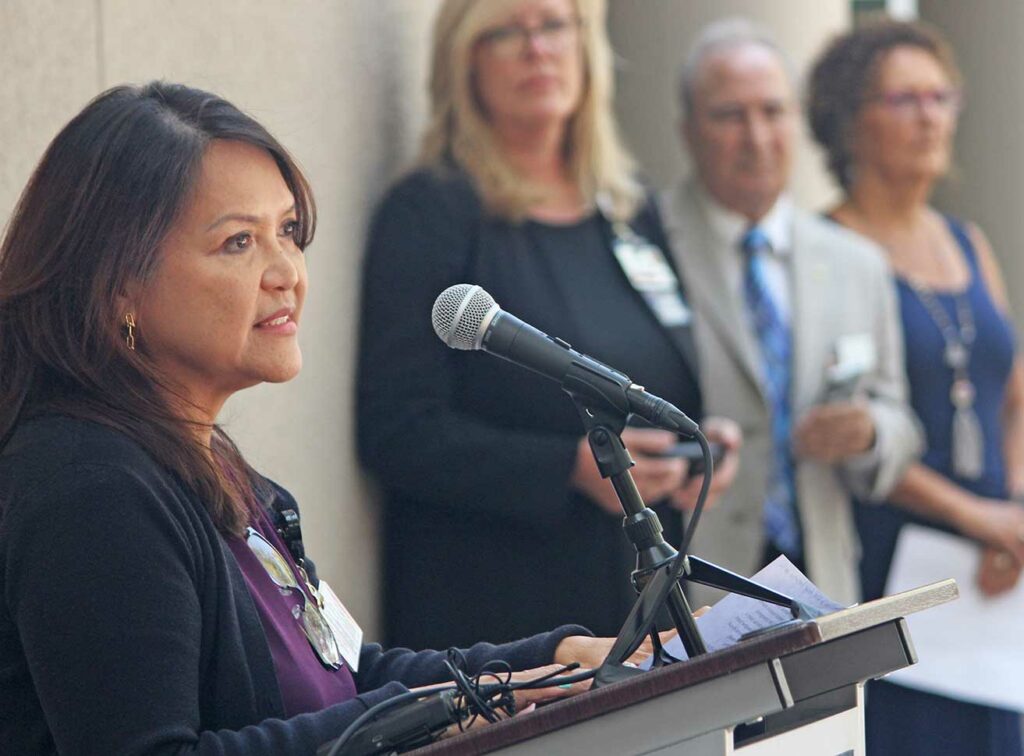
County health officials celebrated the opening of a new location at St. Louise Regional Hospital in Gilroy on Aug. 31 that provides treatment and examinations for victims of sexual assault.
The opening of the Sexual Assault Forensic Exam program (SAFE) comes at a time when sexual assault and domestic violence cases are on the rise throughout Santa Clara County.
According to data provided by Santa Clara Valley Healthcare, medical exams conducted by the SAFE program stood at 477 in 2019. After a drop to 447 in 2020, the numbers rose sharply over the next two years, at 677 in 2021 and 898 in 2022. As of May, 396 exams have been performed this year.
“Gender-based violence does not discriminate and can be experienced by individuals of all backgrounds, regardless of race, ethnicity, gender and socioeconomic status,” County Supervisor Sylvia Arenas said. “For seven years, I have been sounding the alarm on the increasing rate of gender-based violence and remain a steadfast advocate on behalf of survivor-centered rights and access.”
The expansion includes medical forensic exams—also known as a SAFE kit—for individuals aged 12 and older needing treatment and/or evidence collection after assault.
The SAFE program includes a medical evaluation, including treatment for sexually transmitted infections, emergency contraception and evidence collection, including digital imaging. The SAFE team offers referrals for appropriate medical and psychological follow-up, including support and participation in legal proceedings. The SAFE Program also works with confidential advocates, who provide in-person and ongoing support after an exam.

Medical personnel are required to report to the police instances in which a SAFE process is initiated. However, survivors have the right to choose to get medical care but not to report to law enforcement or participate in an investigation, as well as the right to change their mind and make a report at a later time.
Now in addition to the St. Louise center, the SAFE program has locations at Santa Clara Valley Medical Center in San Jose, Stanford Health Center in Palo Alto, Dominican Hospital in Santa Cruz and Children’s Advocacy Center in San Jose.
Kim Walker, nurse manager of the SAFE program, said nurses are able to respond within an hour of receiving the call. The new South County center provides a closer location for not only Gilroy and Morgan Hill residents, but also those who reside in San Benito County, she said.
“No matter where a survivor enters the system, we can all make sure the patient is supported kindly, respectfully and in a trauma-informed manner throughout the process,” Walker said.
Gilroy Police Chief Pedro Espinoza said the opening of the SAFE program in South County will help facilitate not only the healing process for victims, but also bring those responsible for the crime to justice.
“It’s unfortunate that we have a need of centers like this, but the reality is, that is the world we live in,” he said. “Now that we have the SAFE center in South County, it will allow us the capacity to expeditiously coordinate these resources for survivors.”
Morgan Hill Police Chief Shane Palsgrove agreed, adding that the new center will provide easier access to support for the victims.
“This has tremendous benefits for our survivors and our community,” he said. “Local access is another step toward improving support for our survivors.”
Michelle de la Calle, speaking to a gathering of hospital, city and county officials on Aug. 31, said she was the victim of rape in 1991 in Santa Clara County, and received services from the SAFE program during its early days.
“The team knew how to respond, and I needed that,” she said. “I needed to be believed and I needed to be heard. What happened to me felt unreal and was unbelievable. The team made me feel safe and supported.”
De la Calle added that, thanks to the evidence collected throughout the process, her assailant was eventually convicted.
Health officials provided the following guidance for what to do if a person is assaulted:
• Get to a location where you are out of danger
• Contact a trusted support person for help, which may include a sexual assault or domestic violence advocacy agency
• SAFE exams for sexual assault may be provided up to 10 days after the assault
• SAFE exams for domestic violence or intimate partner violence may be provided up to 14 days after the assault
• Seek counseling and support
The SAFE program can be reached 24/7 at 408.793.7233. For information, visit tinyurl.com/ms9s4cx5.













